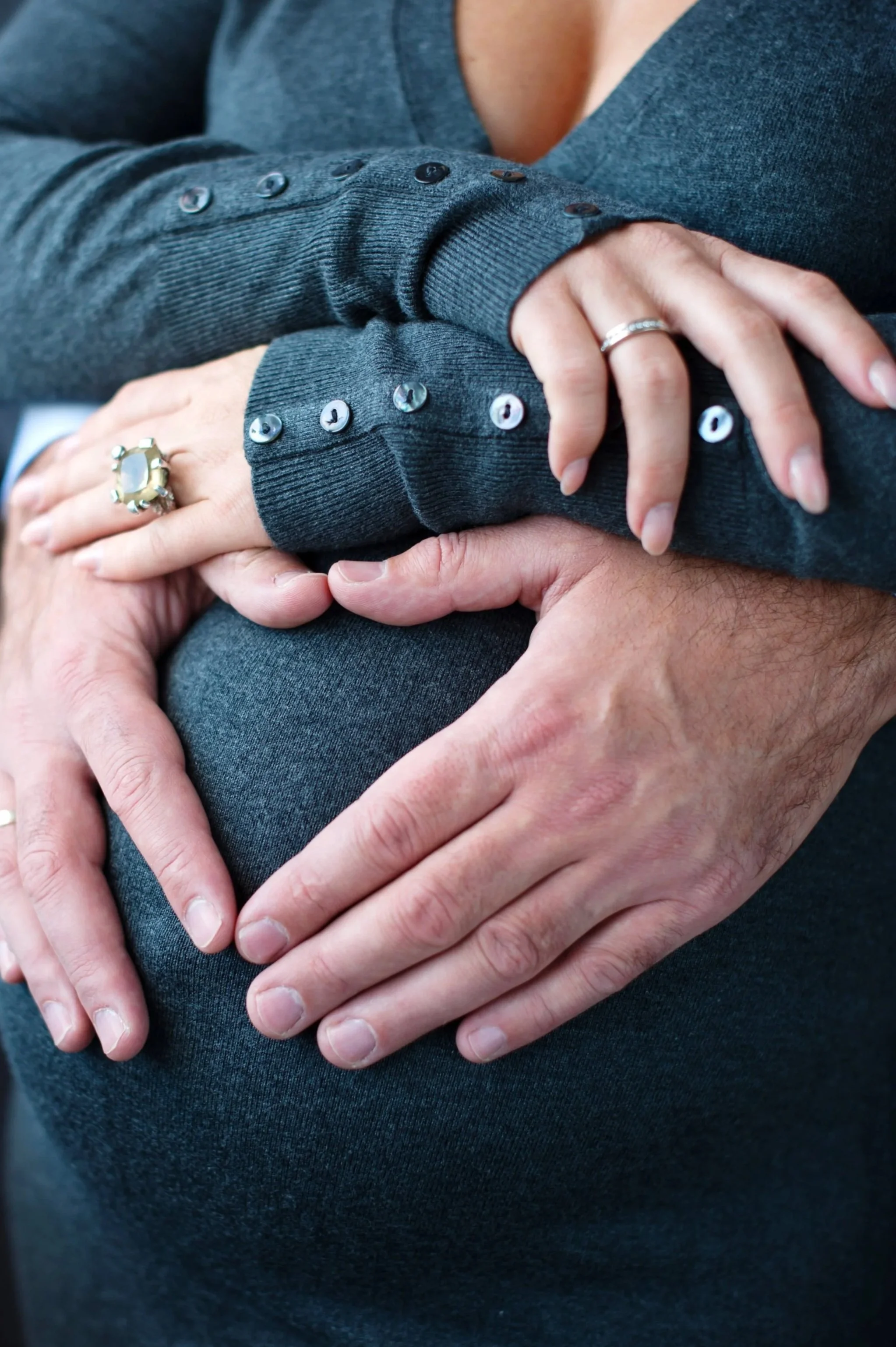Carpal Tunnel in Pregnancy
Carpal Tunnel in Pregnancy
What That Tingling Really Means (and How to Fix It)
You’re finally trying to get some sleep, and your hands start tingling. Or maybe you wake up in the night with your fingers numb and your wrists aching. You shake them out, flex your fingers, and wonder if this is something serious.
Let’s take a deep breath and unpack this — because carpal tunnel in pregnancy is very common, very uncomfortable, and usually semi-fixable.
What’s Actually Happening
Carpal tunnel syndrome happens when swelling in the wrist compresses a nerve that runs from your forearm into your hand. During pregnancy, your body holds on to extra fluid and your hormones relax connective tissue. That combination can cause fluid to shift into your tissues. The fluid puts pressure on the median nerve — especially at night. It’s worse if you happen to sleep with your arms curled up and your wrists bent. Some people even have it in the daytime if their hands are bent for a long time with keyboarding, texting, or holding the steering wheel.
This blog will include everything you need to know about understanding and treating your symptoms including
the symptoms of carpal tunnel syndrome
strategies to help it:
movement & position
body work
nutrition and
sleep hygiene
Symptoms - How to identify carpal tunnel syndrome
Most pregnant people notice:
Numbness or tingling in the thumb, index, or middle fingers
Burning or pain in the wrist or hand
Weak grip or clumsiness
Waking up at night needing to “shake it out”
It’s not dangerous — but it’s your body’s way of saying “Hey, the pressure’s too high here.”
Why It Gets Worse at Night
When you lie down, fluids redistribute and can collect in your wrists and hands. Plus, many people sleep with their wrists flexed (bent inward), which narrows the tunnel even more. That’s why the tingling often wakes you up in the wee hours.
What You Can Do (That Actually Works)
Movement and Positioning
Keep wrists straight: Use a neutral wrist brace at night (the kind that keeps your wrist straight, not bent).
Shake and stretch: Gently roll wrists, flex fingers, and stretch forearms several times a day.
Avoid repetitive motion: Limit long typing, texting, or cutting food without breaks.
Elevate your hands: Especially if your fingers feel puffy — rest your hands on a pillow when reclining.
Chiropractic and Bodywork
Pregnancy-safe chiropractic adjustments can help balance your upper spine, shoulders, and wrists to reduce nerve compression. Many chiropractors also use gentle wrist and elbow mobilizations that improve circulation and release trapped tension. Check out Fusion Chiropractic Spa in Frisco. Dr. Trevyn Fugere has a few modalities that can help with carpal tunnel. And, he gives a discount to our clients.
Massage, craniosacral therapy, or myofascial release can also work wonders for fluid movement and nerve flow.
Acupuncture and Acupressure
Acupuncture helps reduce inflammation and swelling while promoting nerve healing. It’s one of the most effective non-drug treatments for carpal tunnel — even outside of pregnancy. Dr. Trevyn Fugere at Fusion Chiropractic Spa is amazing at acupuncture and acupressure.
At home, you can gently press the acupoint Pericardium 6 (on the inner wrist, about three finger-widths below the crease) for one to two minutes to calm pain and numbness.
Nutrition Support
Anti-inflammatory foods: Think avocados, salmon, chia seeds, turmeric, leafy greens, and berries.
Hydration: Extra water helps flush fluid and reduce swelling — aim for at least half your body weight in ounces daily.
Salt balance: Increasing your sodium can help fluids move more easily in your body. Add electrolytes to your water and stay very hydrated. And, salt your food to taste with unrefined sea salt.
Vitamin B6: Found in bananas, chickpeas, and sunflower seeds — or consider a quality prenatal with active B6 (pyridoxal-5-phosphate). B6 has been shown to help nerve healing and reduce tingling.
Magnesium: Supports nerve and muscle function. Magnesium glycinate or citrate before bed can also help sleep.
Sleep Hygiene
Prop your wrists on a small pillow to stay neutral.
Avoid sleeping with your hands under your head or pillow.
Try side sleeping with a full-body pillow to keep shoulders open and circulation flowing.
If nighttime swelling is intense, elevate your hands slightly above heart level for a few minutes before bed.
If you are very uncomfortable, you can buy wrist braces to wear at night.
Call Your Midwife:
If you notice increasing pain, weakness in your hands (like dropping things), or swelling that seems one-sided, reach out to your midwife. We can help determine if a referral to physical therapy or occupational therapy would help, or if there’s something else contributing to the swelling.
In most cases, symptoms resolve completely within a few weeks after birth — once fluid shifts back to normal.
In the meantime, gentle prevention and consistent support make a big difference.
You’re Not Falling Apart — You’re Just Pregnant
Carpal tunnel isn’t a sign your body’s breaking down; it’s a sign that your circulation and connective tissue are adapting to the incredible work of pregnancy.
With the right body mechanics, nutrition, and support, you can absolutely stay comfortable — and keep those hands ready for all the baby snuggles coming your way.

